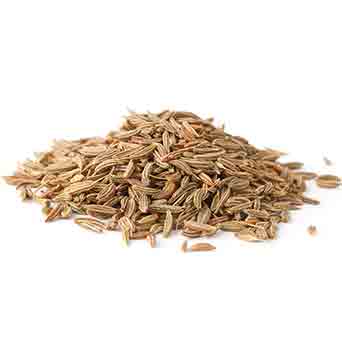Bartoňková I, Dvořák Z Food Chemistry & Toxicology ABSTRACT: Essential oils (EOs) of culinary herbs and spices are used to flavor, color and preserve foods and drinks. Dietary intake of EOs is significant, deserving an attention of toxicologists. We examined the effects of 31 EOs of culinary herbs and spices on the transcriptional activity of human… Read more »

Cumin Essential Oil
- Botanical Name: Cuminum cyminum
- Alternative Names: Zeera
- Botanical Family: Apiaceae
- Primary Constituent: Gamma-terpinene or cuminaldehyde
- Other Main Constituents: Beta-pinene, Para-cymene
- Distillation Method: Steam Distillation
- Plant Part: Seed
Evaluation of antioxidant potential of essential oils of some commonly used Indian spices in in vitro models and in food supplements enriched with omega-6 and omega-3 fatty acids.
Bag A, Chattopadhyay RR Environmental Science and Pollution Research, 2017 ABSTRACT: The aim of this study was to evaluate and compare the antioxidant potential of essential oils of some commonly used Indian spices (black pepper, cinnamon, clove, coriander and cumin) in various in vitro models and in food supplements enriched with omega-6 and omega-3 fatty acids. In… Read more »
Biased activity of soluble guanylyl cyclase: the Janus face of thymoquinone
Detremmerie C, Vanhoutte PM, Leung S Acta Pharmaceutica Sinica. B, 2017 ABSTRACT: The natural compound thymoquinone, extracted from Nigella sativa (black cumin), is widely used in humans for its anti-oxidative properties. Thymoquinone is known for its acute endothelium-independent vasodilator effects in isolated rat aortae and pulmonary arteries, depending in part on activation of adenosine triphosphate-sensitive potassium channels and inhibition… Read more »
Interaction of human telomeric G-quadruplex DNA with thymoquinone: a possible mechanism for thymoquinone anticancer effect
Salem AA, El Haty IA, Abdou IM, Mu Y Biochimica et Biophysica Acta, 2015 ABSTRACT: BACKGROUND: Thymoquinone (TQ) has been documented to possess chemo-preventive and chemotherapeutic antitumor effects. Studies reported that TQ inhibits the growth of cancer cells in animal models, culture and xenografted tumors. Molecular mechanisms underlying these anticancer effects were attributed to inductions of cell cycle arrest,… Read more »
Thymoquinone induces telomere shortening, DNA damage and apoptosis in human glioblastoma cells
Gurung RL, Lim SN, Khaw AK, Soon JF, Shenoy K, Mohamed Ali S, Jayapal M, Sethu S, Baskar R, Hande MP PloS One, 2010 ABSTRACT: BACKGROUND: A major concern of cancer chemotherapy is the side effects caused by the non-specific targeting of both normal and cancerous cells by therapeutic drugs. Much emphasis has been placed on discovering new compounds that target tumour cells more… Read more »
Evaluation the effect of 50 and 100 mg doses of Cuminum cyminum essential oil on glycemic indices, insulin resistance and serum inflammatory factors on patients with diabetes type II: A double-blind randomized placebo-controlled clinical trial
Jafari S, Sattari R, Ghavamzadeh S Journal of Traditional and Complementary Medicine, 2017 ABSTRACT: AIM: The purpose of this study was to evaluate the effect of 50 and 100 mg doses of green cumin essential oil on glycemic and inflammatory indices in patients with diabetes type II. METHOD: In this randomized double-blind placebo-controlled clinical trial, subjects were divided into three… Read more »
Deodorizing Substance in Black Cumin (Nigella sativa L.) Seed Oil
Nakasugi T, Murakawa T, Shibuya K, Morimoto M Journal of Oleo Science, 2017 ABSTRACT: A deodorizing substance in black cumin (Nigella sativa L.), a spice for curry and vegetable foods in Southwest Asia, was examined. The essential oil prepared from the seeds of this plant exhibited strong deodorizing activity against methyl mercaptan, which is a main factor in oral malodor…. Read more »
The Effect of Thymoquinone on Apoptosis of SK-OV-3 Ovarian Cancer Cell by Regulation of Bcl-2 and Bax
Liu X, Dong J, Cai W, Pan Y, Li R, Li B International Journal of Gynecological Cancer, 2017 ABSTRACT: OBJECTIVE: We aim to determine how cisplatin, thymoquinone (TQ), and combination regimen can affect apoptosis of cultured SK-OV-3 cells. We also want to explore the mechanism of these influences on the cells’ apoptosis by Bcl-2 and Bax gene. METHOD/MATERIALS: Cell Counting Kit-8 assay… Read more »
Aromatherapy and Essential Oils (PDQ®): Health Professional Version
PDQ Integrative, Alternative, and Complementary Therapies Editorial Board PDQ Cancer Information Summaries, 2017 EXCERPT: This PDQ cancer information summary for health professionals provides comprehensive, peer-reviewed, evidence-based information about the use of aromatherapy and essential oils in the treatment of people with cancer. It is intended as a resource to inform and assist clinicians who care for cancer… Read more »
Neuroprotective and Anti-Aging Potentials of Essential Oils from Aromatic and Medicinal Plants
Ayaz M, Sadiq A, Junaid M, Ullah F, Subhan F, Ahmed J Frontiers in Aging Neuroscience, 2017 ABSTRACT: The use of essential oils (EOs) and their components is known since long in traditional medicine and aromatherapy for the management of various diseases, and is further increased in the recent times. The neuroprotective and anti-aging potentials… Read more »
